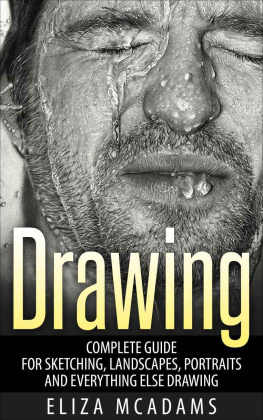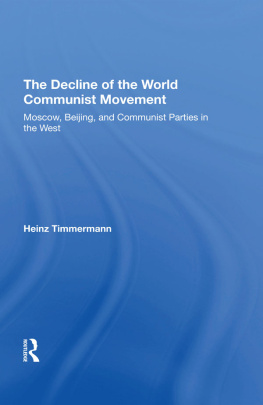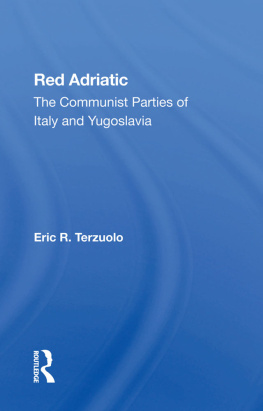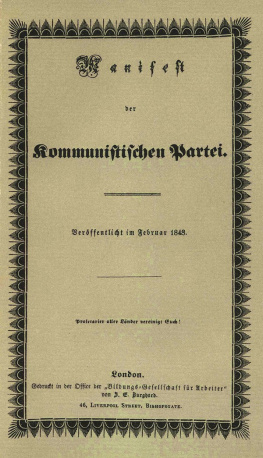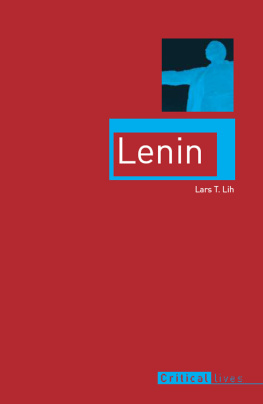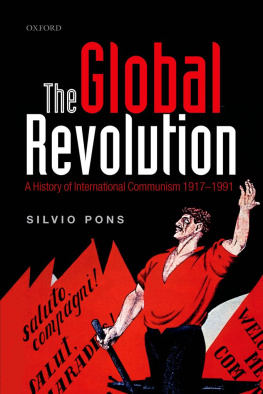VANGUARD OF THE REVOLUTION
The Global Idea of the Communist Party
A. J AMES M C A DAMS
PRINCETON UNIVERSITY PRESS
Princeton & Oxford
Copyright 2017 by Princeton University Press
Published by Princeton University Press, 41 William Street, Princeton, New Jersey 08540
In the United Kingdom: Princeton University Press, 6 Oxford Street, Woodstock, Oxfordshire OX20 1TR
press.princeton.edu
Jacket image : Vladimir Lenin, Leon Trotsky, and Lev Kamenev. Universal History Archive / UIG / Bridgeman Images
All Rights Reserved
ISBN 978-0-691-16894-4
Library of Congress Control Number: 2017941546
British Library Cataloging-in-Publication Data is available
This book has been composed in Garamond Premier Pro, Goudy Trajan, and ITC Legacy Sans Std
Printed on acid-free paper.
Printed in the United States of America
10 9 8 7 6 5 4 3 2 1
To Nancy
and
To our children and grandchildren
CONTENTS
PREFACE
What isor wasthe communist party? Political scientists and historians have produced a rich and extensive literature on individual parties. Thanks to this scholarship, we have both provocative theories and painstaking analyses covering the evolution and organization of nearly every communist party in the world. These studies range from such behemoths as the Communist Party of the Soviet Union and the Chinese Communist Party to much smaller, though no less interesting, parties such as the Albanian Party of Labor and the Mongolian Peoples Revolutionary Party. Yet, there are virtually no comprehensive studies of the communist party overall. This is surprising. In the twentieth century, the communist party was one of the two most influential party institutions in the world. It was the primary challenger to the liberal-democratic party. Communist leaders ruled huge parts of the globe and demanded the attention of hundreds of millions of people.
In this book, I seek to fill this gap through a systematic examination of this unique institution. I have two goals. The first is to provide an interpretive political history of the partys evolution over long periods and in vastly diverse settings. Despite the similarities in their names and shared beliefs, communist parties in countries like Germany, the United States, North Korea, and Cuba differed in fundamental ways. They also changed over time. My second goal is to offer a cohesive argument about why these parties took so many different forms. I contend that these differences were driven by their leaders choices about a recurring theme: the relationship between the idea of the revolutionary party and the need for an effective party organization. Without compelling ideas, I argue, these parties would have had few followers, and without coherent organizations, they would have fallen apart.
In structuring my account, I have deliberately sought to speak to both scholars and general readers. I hope that political scientists and historians who specialize in one part of the world will find my analysis of the global evolution of the communist party useful for comparing their cases with those in other regions. Naturally, given the scope of my study, I have not been able to cover the cases of every party or every period in the communist era. Additionally, I hope that general readers will find this study to be a provocative introduction to one of the most significant political institutions of modern times. I have avoided jargon and limited endnotes to primary sources and statistical sources (wherever possible in English). Rather than providing an exhaustive bibliography, I have prepared a list of suggested English-language readings that should help the reader begin to explore my topic.
This book is the product of many years of studying, writing, and teaching about world communism. Many people have played a role in its gestation. In the early stages of my career, I was fortunate to encounter and be inspired by many of the foremost thinkers in the field that was then known as comparative communism: Cyril Black, George Breslauer, Stephen Cohen, Gregory Grossman, Andrew Janos, Ken Jowitt, Richard Lwenthal, Norman Naimark, Robert Tucker, Richard Ullman, and Dale Vree.
In writing this book, I have benefited from the advice, generosity, and encouragement of numerous people. I am indebted to those who read and commented on significant segments of the manuscript: George Breslauer, Lowell Dittmer, Graeme Gill, Michel Hockx, Victoria Tin-bor Hui, Lionel Jensen, George Liber, Stephen Lovell, Semion Lyandres, Alex Martin, and Maria Rogacheva. I am also grateful to many others for their advice on individual chapters: Heinrich Bortfeldt, Shaojin Chai, Forrest Colburn, John Deak, Felipe Fernndez-Armesto, Robert Fishman, Andy Gould, Ferenc Hrcher, Hrvoje Kekez, Elisabeth Khler, Jeff Kopstein, Tom Kselman, Willem Melching, Balazs Mezei, Olivier Morel, Norman Naimark, Slawomir Nowosad, David OConnor, Francesco Pitassio, Richard Rose, Wolfgang Seibel, Roman Setov, Ivette Sosa-Frutos, Ernesto Verdeja, Lynn White, and John Quangsheng Zhao. In addition, I thank the anonymous reviewers of this book for their excellent counsel. Finally, I express my gratitude to my graduate and undergraduate research assistants for their tireless work on my behalf: Joshua Bandoch, Michael Bocchino, Omar Coronel-Cuadros, Ellen Dahlby, Juan Albarracn Dierolf, Helen Favorite, April Dan Feng, Laura Gamboa-Gutierrez, Brian Klein, Stephen Payne, Ana Petrova, Luis Schenoni, Gregory Siems, Flora Xiao Tang, Thomas White, and Kathy Wodolowski.
For more than two and a half decades, I have been fortunate to be a faculty member at the University of Notre Dame. In this unique intellectual community, I continue to be inspired by both my colleagues and my students, for their love of learning and their faith that scholarly pursuits should never be separated from their human context. For many years, I have been especially lucky to direct the Nanovic Institute for European Studies. Located within the Keough School for Global Affairs, the Nanovic Institute is an extraordinary home for interdisciplinary scholarship and conversation among all fields in the humanities, the arts, and the social sciences. I extend my heartfelt thanks to all of the Institutes staff members for their support. In particular, I am deeply grateful to Sharon Konopka. Over the past fifteen years, Sharon has helped me in countless ways to balance my multiple responsibilities at Notre Dame, and she has been an unflagging source of wisdom and good humor. In addition, I thank Cathy Bruckbauer, who has skillfully dissected my prose and been a much-needed source of insight and encouragement.
I am grateful to the Dr. William M. Scholl Foundation, which for many years has played a crucial role in making my scholarship possible. In 20122013, the Kulturwissenschaftliches Kolleg in Konstanz, Germany, afforded me an invaluable opportunity to conduct research while overlooking the Rhine River. I have been fortunate to publish this book with Princeton University Press. I am especially grateful to my editor, Eric Crahan, for his confidence, enthusiasm, advice, and patience. Also, I thank Kathleen Cioffi, John Donohue, and Hannah Zuckerman for their help in producing this book.
Finally, I dedicate this book with love to Nancy, without whose boundless understanding and devotion it would not exist, and to our children and grandchildren. In these politically tumultuous times, when liberal democracy is once again threatened by extremism and intolerance, I hope they will be inspired by public servants who are worthy of their intelligence, open-mindedness, and goodness.
NOTE
In writing a book that covers the histories of scores of parties over more than one and a half centuries, I have inevitably had to wrestle with word usage. As a rule, I have followed the conventions of a majority of scholars in matters of transliteration and abbreviation. For the transliteration of most Chinese words, I follow the Pinyin system. For example, I use Mao Zedong rather than Mao Tse-tung and Guomindang rather than Kuomintang. In exceptional cases, I have followed the established practice of using the Wade-Giles system. Thus, I use Chiang Kai-shek instead of Jiang Jieshi and Peking University instead of Beijing University. Russian transliterations can be even more complicated. I have used a hybrid model, one based on the ALA/LOC standard but also incorporating popularly accepted variants. For example, I use Grigory Zinoviev instead of Grigorii Zinovev.


